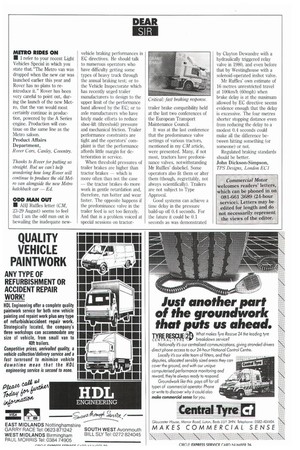DEAR
Page 35

If you've noticed an error in this article please click here to report it so we can fix it.
SIR
refer to your recent Light Vehicles Special in which you state that "The Metro van was dropped when the new car was launched earlier this year and Rover has no plans to reintroduce it." Rover has been very careful to point out, during the launch of the new Metro, that the van would most certainly continue in production, powered by the A Series engine. Production will continue On the same line as the Metro saloon.
Product Affairs Department, Rover Cars, Canley, Coventry.
Thanks to Rover for putting us straight. But we can't help wondering how long Rover will continue to produce the old Metro van alongside the new Metro hatchback car — Ed.
• ART Ruffles letter (CM, 23-29 August) seems to feel that I am the odd man out in bewailing the inadequate new vehicle braking performances in EC directives. He should talk to numerous operators who have difficulty getting some types of heavy truck through the annual braking test; or to the Vehicle Inspectorate which has recently urged trailer manufacturers to design to the upper limit of the performance band allowed by the EC; or to axle manufacturers who have lately made efforts to reduce shoe-lift (threshold) pressure and mechanical friction. Trailer performance constraints are tight and the operators' complaint is that the performance affords little margin for deterioration in service.
When threshold pressures of trailer brakes are higher than tractor brakes — which is more often than not the case — the tractor brakes do more work in gentle retardation and, therefore, run hotter and wear faster. The opposite happens if the predominance valve in the trailer feed is set too fiercely. And that is a problem voiced at special sessions on tractor trailer brake compatibility held at the last two conferences of the European Transport Maintenance Council.
It was at the last conference that the predominance valve settings of various tractors, mentioned in my CM article, were presented. Many, if not most, tractors have predominance valves, notwithstanding Mr Ruffles' disbelief. Some operators also fit them or alter them (though, regrettably, not always scientifically). Trailers are not subject to Type Approval.
Good systems can achieve a time delay in the pressure build-up off 0.4 seconds. For the future it could be 0.1 seconds as was demonstrated by Clayton Dewandre with a hydraulically triggered relay valve in 1980, and even before that by Westinghouse with a solenoid-operated inshot valve.
Mr Ruffles' own estimate of 16 metres unrestricted travel at 100km/li (60mph) when brake delay is at the maximum allowed by EC directive seems evidence enough that the delay is excessive. The four metres shorter stopping distance even from reducing the delay to a modest 0.4 seconds could make all the difference between hitting something (or someone) or not.
Regulated braking standards should be better.
John Dickson-Simpson, TPS Designs, London EC 1




































































